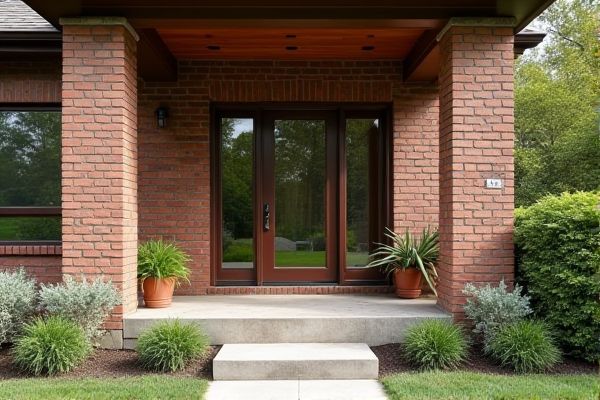
Choosing between a brick porch and a concrete porch depends on your aesthetic preferences, budget, and maintenance expectations, as brick offers classic charm and durability while concrete provides versatility and cost-effectiveness. Explore this article to understand the benefits and drawbacks of both options to determine which porch style suits Your home best.
Table of Comparison
| Feature | Brick Porch | Concrete Porch |
|---|---|---|
| Material | Clay bricks | Mixed cement, sand, gravel |
| Durability | High, weather resistant | Very high, crack resistant with reinforcement |
| Maintenance | Periodic sealing and tuckpointing | Low, occasional cleaning and sealing |
| Cost | Moderate to high | Low to moderate |
| Installation Time | Longer, skilled labor required | Faster, less labor intensive |
| Aesthetic Appeal | Classic, timeless, warm look | Modern, smooth finish, versatile |
| Customization | Limited to brick patterns and colors | Wide range of finishes, stains, and stamps |
| Slip Resistance | Good with textured bricks | Variable, depends on finish |
| Environmental Impact | Sustainable if recycled bricks used | High carbon footprint due to cement |
Introduction: Brick Porch vs Concrete Porch
Brick porches offer classic aesthetic appeal and excellent durability due to their natural thermal insulation properties, making them ideal for traditional home designs. Concrete porches provide versatile design options with customizable finishes, higher resistance to cracking, and generally lower installation costs compared to brick. Both materials require regular maintenance, but concrete typically allows for quicker repairs and can better accommodate modern structural demands.
Durability Comparison
Brick porches offer exceptional durability with natural resistance to weathering, cracking, and settling, maintaining structural integrity for decades. Concrete porches provide strong durability with high compressive strength and resistance to heavy loads, but they may be prone to surface cracking over time due to freeze-thaw cycles. Proper installation and sealing can enhance the lifespan of both materials, but brick generally outperforms concrete in long-term resilience under varied environmental conditions.
Cost Analysis
Brick porches typically cost between $15 to $30 per square foot due to material and labor intensity, making them more expensive than concrete porches, which range from $6 to $15 per square foot. Concrete offers a cost-effective solution with lower maintenance expenses over time, while brick requires periodic sealing and potential repairs that add to long-term costs. Homeowners on a budget often prefer concrete for its affordability and durability, whereas those seeking aesthetic value may invest more upfront in brick porches.
Aesthetic Appeal
Brick porches offer a warm, classic aesthetic with rich textures and natural color variations that enhance curb appeal, while concrete porches provide a sleek, modern look with versatile finishing options such as stamping or staining. The choice between brick and concrete significantly impacts the home's exterior style, where brick brings timeless charm and textured depth, and concrete allows for customization in patterns and hues. Homeowners seeking traditional elegance often prefer brick, whereas those desiring contemporary design might opt for concrete due to its adaptability and clean lines.
Maintenance Requirements
Brick porches require regular sealing to prevent moisture damage and occasional repointing of mortar joints to maintain structural integrity. Concrete porches generally need less frequent maintenance but should be inspected for cracks and sealed every few years to avoid water infiltration and surface deterioration. Both materials benefit from routine cleaning to prevent staining and weed growth in joints.
Installation Process
Brick porch installation involves laying individual bricks with mortar, requiring careful alignment and curing time to ensure durability and aesthetic appeal. Concrete porch installation typically includes pouring a concrete mix onto a prepared subbase, followed by smoothing and finishing before curing, resulting in a faster completion time compared to brick. Both methods demand proper site preparation and moisture control to prevent structural issues and extend the lifespan of the porch.
Weather Resistance
Brick porches offer excellent weather resistance due to their natural durability and ability to withstand freeze-thaw cycles without cracking. Concrete porches provide strong resistance against moisture and heavy loads but may require sealing to prevent surface erosion and avoid damage from prolonged exposure to extreme temperatures. Both materials perform well in various climates, with brick favored for breathability and concrete preferred for its versatility and easy maintenance.
Customization Options
Brick porches offer extensive customization options with varied colors, patterns, and textures that create a classic, timeless look tailored to your home's style. Concrete porches provide flexibility through staining, stamping, and coloring techniques, allowing for modern or intricate designs that can mimic natural stone or tile. Your choice depends on whether you prioritize the traditional charm of brick or the versatile design potential of concrete.
Environmental Impact
Brick porches have a lower environmental impact compared to concrete porches due to bricks being made from natural clay and fired at high temperatures, which allows for recyclability and biodegradability. Concrete production generates significant carbon dioxide emissions, contributing to global warming, and its ingredients like cement require energy-intensive manufacturing. Choosing a brick porch can reduce your carbon footprint and support more sustainable building practices.
Which Porch Material is Right for You?
Brick porches offer timeless charm and durability, making them ideal for homeowners seeking a classic, low-maintenance option that withstands weather well. Concrete porches provide versatile design options and cost-effectiveness, allowing you to customize your space with various finishes and colors to match your style. Consider your budget, desired aesthetic, and long-term maintenance when determining which porch material is right for your home.
 homyna.com
homyna.com